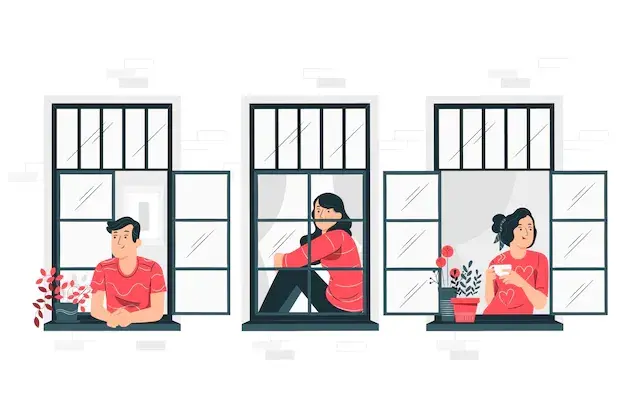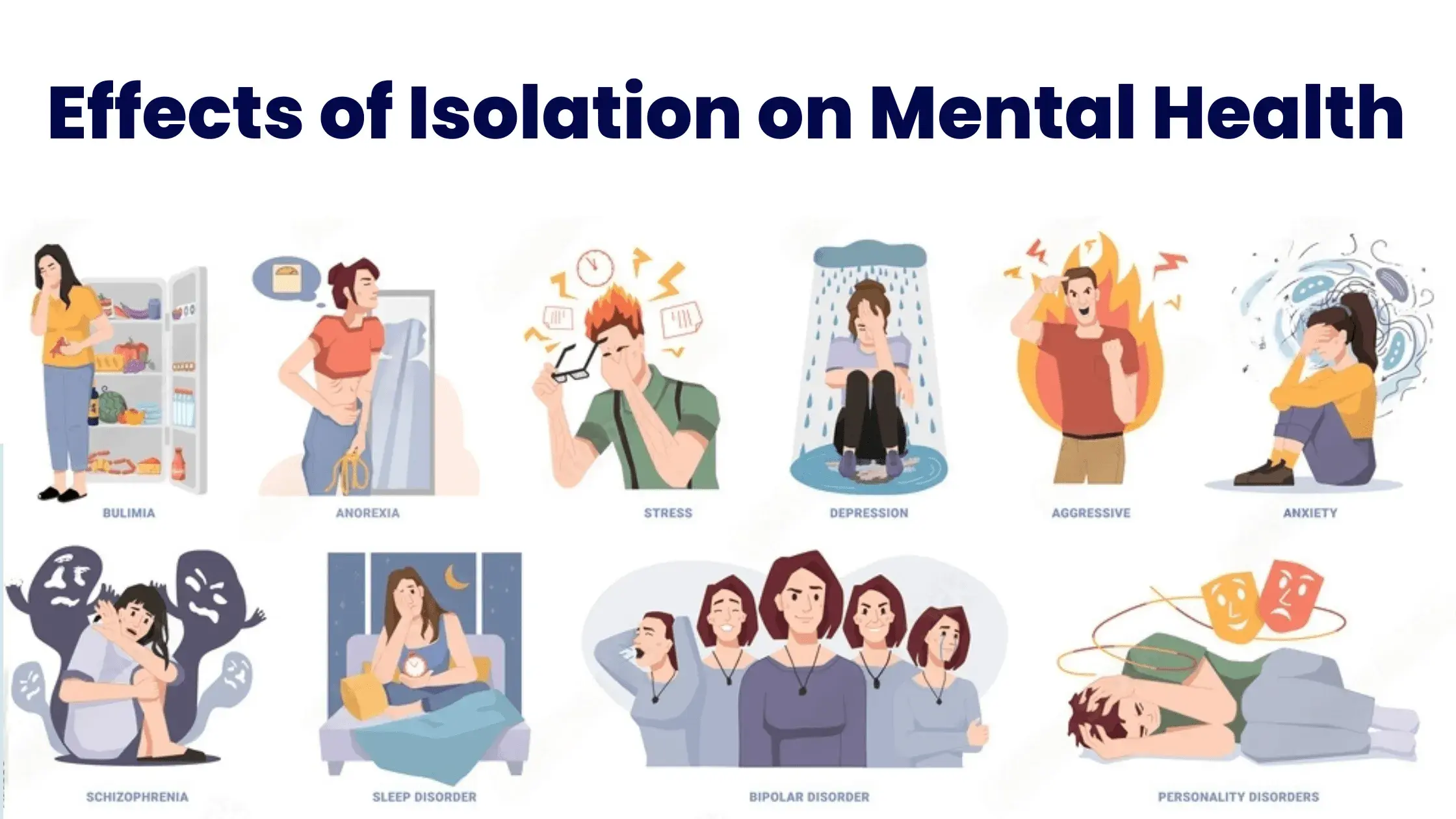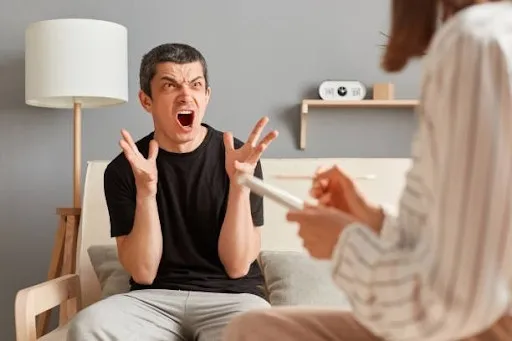Effects of Isolation on Mental Health - The Greek philosopher Aristotle has called human beings as 'social animals' and very rightly so. We tend to socialize constantly in one way or the other throughout our lifetime. Some researchers have even said that social interaction is a basic biological need in human beings and if denied that, abnormal complications can arise in our brain and behavioural structure. Owing to the present unprecedented crisis of the COVID-19 pandemic, people have been forced to maintain physical distance from each other so that the spread of coronavirus can be minimized as much as possible. Moreover, people who have been exposed or potentially exposed to the virus are supposed to be in total isolation for 14-15 days and studies are increasingly showing the adverse effects this isolation is having on mental health. It has been linked to symptoms of depression, anxiety, and feelings of loneliness. As the isolation period keeps increasing, the effects keep multiplying too, leading to extreme mental abnormalities like dementia, schizophrenia, and suicidal behaviors.
Effects of Isolation on Mental Health | Effects of Social Isolation
 A study in the past has cited that people who have been isolated and kept away from social interaction, started showing improper sleep cycles, decreased interest in any sort of self-care, feelings of sadness, aggressive behaviours and unalignment with their daily routines. This indicates the importance of communication, social connectivity and belongingness in people's lives. You might be surprised to know that feelings of loneliness can harm your physical health too. People who stress out too much, have negative emotions and anxiety, are more susceptible to Coronary Artery Disease, stroke and weakened immune system.
A study in the past has cited that people who have been isolated and kept away from social interaction, started showing improper sleep cycles, decreased interest in any sort of self-care, feelings of sadness, aggressive behaviours and unalignment with their daily routines. This indicates the importance of communication, social connectivity and belongingness in people's lives. You might be surprised to know that feelings of loneliness can harm your physical health too. People who stress out too much, have negative emotions and anxiety, are more susceptible to Coronary Artery Disease, stroke and weakened immune system.  Though social distancing helps a great deal to curb the spread of coronavirus, it has led to feelings of uncertainty, low self-esteem, sadness, and loneliness among a lot of people, especially those who live alone, belong to older age groups, and are already suffering from a mental condition. On the other hand, people have also been able to stay connected and updated about everything going on, and the role of technology and social media in enabling this cannot be ignored.
Though social distancing helps a great deal to curb the spread of coronavirus, it has led to feelings of uncertainty, low self-esteem, sadness, and loneliness among a lot of people, especially those who live alone, belong to older age groups, and are already suffering from a mental condition. On the other hand, people have also been able to stay connected and updated about everything going on, and the role of technology and social media in enabling this cannot be ignored.
Technology - A complex web of pros and cons during the quarantine
During the year 2020, the connectivity benefits of social media and technology, in general, have been realized like never before. Even though we have been quarantined at home, we have been able to interact with others seamlessly, through phone calls, video calls, text messages, and social media platforms like Instagram, Facebook, Whatsapp etc. Social media has played a savior in these times of pandemic. It has helped people learn things and stay connected with the world, which has consequently helped with feelings of belongingness and certainty to some extent. However, you might have noticed that a considerable amount of your friends and family members are now logging off social media. It is because as connected as one may feel, there are also some negative impacts of the fast-moving online world. Throughout the day, there are constant reminders to be productive and utilize the time available in quarantine- either in the forms of social media updates from friends or daily reminders from influencers. Although this might be meant positively, it has the potential of making people feel like they're not doing enough and give rise to feelings of self-doubt and low self-esteem. Moreover, the harms of extreme use of social media and technology 24x7 are not hidden from us. It triggers anxiety and depression in children and young adults, makes them weary, disturbs sleep cycles and compels them to constantly compare themselves with public figures they see online. One thing that is clear is that social isolation and extreme use of social media during these times of isolation are both harmful for a person's mental health. So, the question is that if there is really a way to preserve good mental health during the COVID-19 pandemic and the good news is that there is. Also Read: Mental Health During Coronavirus & Government Initiative
5 ways to preserve good mental health during social isolation
- Exercise: A good workout session early in the morning or evening, beats all else when it comes to feeling positive and energized. Along with boosting your mood, exercise also offers uncountable health benefits, including maintaining a healthy weight, preventing high blood pressure, reducing the risk of heart problems etc.
- Meditation: It is quite normal to feel edgy and uncertain during a time like this but there are many things that can help you calm your nerves, one of them being meditation. Meditating for just 15-20 minutes per day can help you rejuvenate positivity, focus, and mindfulness. Gratitude meditation is also a great way to let in feelings of humbleness and happiness in your mind.
- Writing or Journaling: Maintaining a daily journal or just simply writing your thoughts down on a piece of paper when you are feeling uneasy, can help you feel more sorted and in control. A practice of writing five things you are grateful about every day is advised by many.
- Pick up a new or long-lost hobby: Do you have a hobby that you enjoyed doing as a kid but had to give up once you grew up? Was it because you didn't have enough time? Well, now is the time to give it a try once again. Even if you are working from home, take out about half an hour from your day and try indulging in the hobby you enjoy the most.
- Spend time in nature: Spending some time out of the house and sitting in your garden, or even on the balcony can help you have a change of environment, leading to a break from the monotonous day inside the house. You might also go to a nearby park for a stroll while taking proper precautions such as wearing a mask and maintaining social distancing.
Also Read: What you should know about your Mental Health after menopause All the activities listed above are optimal for including in your daily routine and preserving mental health as they promote the production of neurotransmitters like dopamine, endorphins, serotonin, and oxytocin- all of which are beneficial for attention, memory, retention, and positive feelings in the body.

Reviewed by







